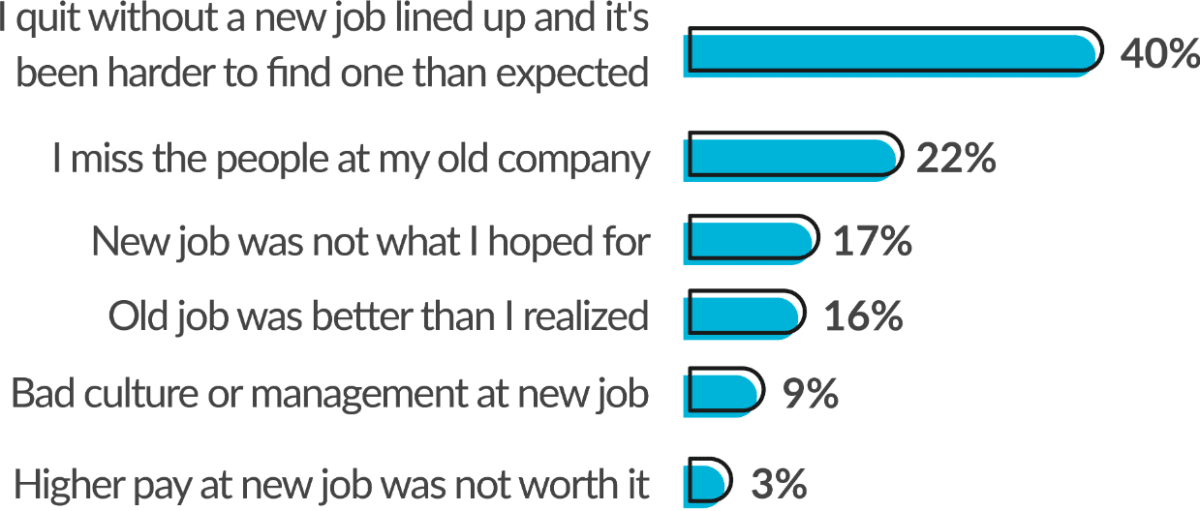
Reality bites when employees find out the grass might not always be greener in the other office
It’s safe to say James was stoked when he scored himself a new job in 2021. It’s not that James, who has asked for his real name not to be used in this story, disliked his old mid-level job at the local government body he works at.
He just saw the new role working in a related department at the same organisation as a way to score a promotion and a bump in pay.
“I was quite enthusiastic about it. It was a senior role, the people seemed really nice, and the pay was good.”
While the allure of a bigger paycheck and more clout was strong, it was still a bittersweet move.
“I knew I was going to miss my old job but I also knew I’d still be working quite a bit with my old team.”
Spoiler alert.
James missed his old job so much he ended up boomeranging back to his previous team after six or so months.
He also joined the people who are suffering from the so-called Great Regret, where people who have shifted jobs realise that the grass is not necessarily greener on the other side.
Reasons people regret quitting their last job

In the United States, a survey of more than 15,000 workers by job-search platform Joblist found 26 percent of workers who quit during the Great Resignation regret their decision.
Of those who found a new job after quitting, 42 percent say their new jobs did not live up to their expectations. The reasons people regretted quitting their last job included finding it harder than expected to secure a new job (40 percent), missing the people at their old company (22 percent), and the old job being better than they realised (16 percent).
“The Great Regret probably isn’t because they left their old job. It’s just that the one they came to wasn’t as good as they thought it would be. Maybe it’s just reality biting them on the butt," –Professor Jarrod Haar, AUT University
The Great Regret is a bit like the rain on the parade of the Big Quit, AUT Professor of Human Resources Jarrod Haar reckons.
“At the moment this Great Resignation gets talked about in a kind of gleeful way, with people excitedly talking about getting a new job, or jumping ship without thinking it through too much,” he says.
“The Great Regret probably isn’t because they left their old job. It’s just that the one they came to wasn’t as good as they thought it would be. Maybe it’s just reality biting them on the butt.”
While they might be pulling a better pay cheque at their new job, they’ll also be realising they took other factors in the old role for granted, such as a good boss and co-workers.
“People will get more money, maybe they get more responsibility, but perhaps they also inherit a terrible team, or they don’t fit in well,” Haar says.

In James’ situation, the new role was not what he had expected and he missed the social aspect of his old team.
While his new manager and colleagues were nice enough, they were tight-knit and he found it difficult to connect over Zoom calls while everyone was working from home during the Covid-19 restrictions.
When the lockdowns lifted, he preferred to be in the office, while his team erred on the side of working from home.
“I like to be in the office every day of the week. I like to collaborate, I like to meet people and exchange ideas,” he says.
Candidates more selective in job hunt 2.0
Employment trends in New Zealand tend to lag behind what is seen in the US, so we might not yet have hordes of people who are suffering from the Great Regret, according to Shannon Barlow, the managing director of Frog Recruitment.
The recruitment agency, however, is anecdotally beginning to see more candidates regret jumping ship for more pay or what appeared to be a better role.
These people either flagged their dissatisfaction during routine follow-ups Frog Recruitment conducted, or they were getting back in touch with the agency to say they’d be interested in any new opportunities that came along.

If they chose to find another job, however, these candidates are pickier and vetting new jobs much more stringently, preferring to bide their time than jump into a job quickly and make the same mistake twice.
“This time employees want to make sure it's going to be the move for the next five or 10 years, not six months,” she says.
James didn’t throw in the towel immediately. He headed off on the Christmas holiday break and returned for the year with a strong resolve to give the new job his best shot. When he came back to work, he raised some issues with his boss. While management had good intentions to sort out his concerns, some of the promises didn’t materialise.
“That left a bit of a foul taste in my mouth.”
Culture is king
So, what should someone do if their new job isn’t working out? Lucy McLernon, the Auckland regional manager for H2R Consulting, says they need to go back to their hiring manager.
“Figure out what it is that's not working and have that really open, honest, transparent conversation with your manager. If they're not aware of it, they can't provide a solution.”
“If you're not selling your employer brand, the development opportunities, the reasons why people should want to work for you, then you may miss out because it is really competitive as we don't have the talent coming into New Zealand at the moment," – Lucy McLernon, H2R Consulting
While salary is important, McLernon says managers need to be thinking about creating a good workplace culture, too.
"The things that candidates are looking for and employers need to be thinking about are flexibility, the office environment, the work-life balance, the benefits, and the development opportunities internally," she says.
“If you're not selling your employer brand, the development opportunities, the reasons why people should want to work for you, then you may miss out because it is really competitive as we don't have the talent coming into New Zealand at the moment."

Bosses should also be taking the pulse of their new hires and checking whether the job is matching up to their expectations, Jarrod Haar says.
“Instead of telling the employee to just jog on, you could ask what their expectations were and what has been missed,” he says.
In some cases, the newbie might not be a bad fit for the organisation and just not slot into that particular team, so managers could consider shuffling them into a more suitable role instead of waving them goodbye.
All's well that ends well, right?
In a serendipitous turn, James’ old team began recruiting for a senior to fill a newly created role this year. He spent some time tossing up whether he should apply for the role, questioning whether he’d given the new role his best shot, but he eventually decided to throw his hat in the ring.
Lucy McLernon says boomerang employees - or old workers who return to the organisation - can be great, depending on the particular situation and whether they left on good terms.
Managers should have an honest conversation about what changed in the employee’s circumstances to get an understanding of why they want to return. But all in all, they can be a great addition to an organisation.
“Boomerang employees have got the prior knowledge. They know the business, they've got the relationships, but it has to be right for both parties. You just need to have a transparent conversation”.
“I’m just taking it as a lesson. People say you have to stay in a job for at least a year, but life's too short to be miserable. If you have regrets, you just have to act on them because that feeling is not going to magically disappear," – James
Now, James didn’t waltz straight back into his old team. He went through the usual application process and treated the interview like any other.
While the job switching was stressful and challenging, James says it's been a valuable learning curve – particularly when it comes to the kinds of questions he’ll be asking in future job interviews.
“Aside from questions about what I’ll be doing, I’ll be asking about what things you do to celebrate as a team, how do people collaborate, how the team is structured, and stuff like that,” he says.
“I’m just taking it as a lesson. People say you have to stay in a job for at least a year, but life's too short to be miserable. If you have regrets, you just have to act on them because that feeling is not going to magically disappear.”







